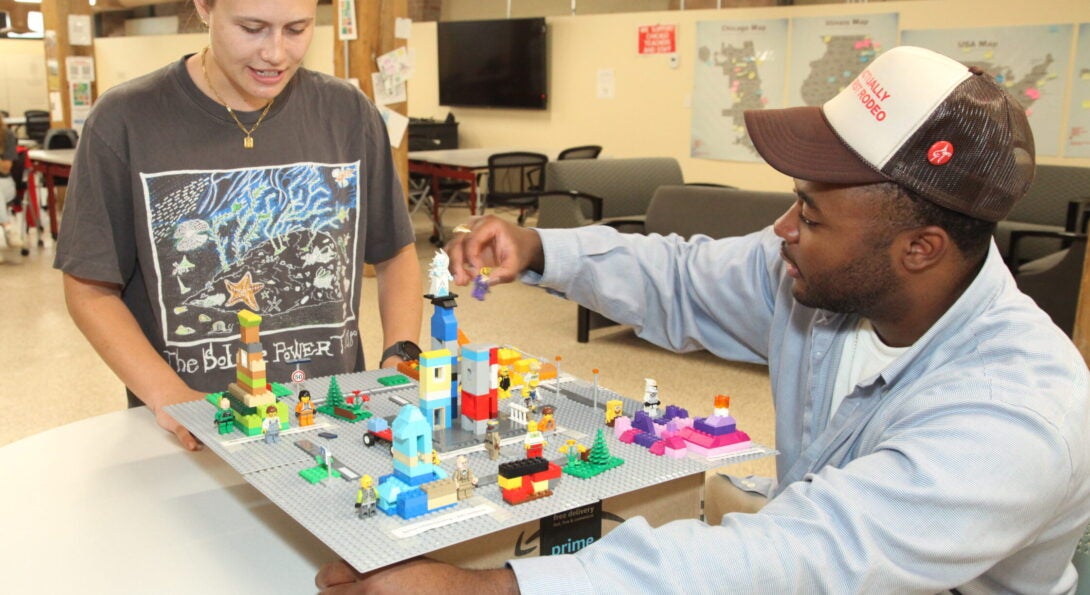The CUPPA Undergraduate Internship Guide

Get Experience ☆ Try a Job ☆ Gain Skills ☆ Expand Your Network
Internships give CUPPA undergraduate students the opportunity to earn academic credit and gain experience outside the classroom in a professional environment. An internship can help you decide whether a particular career path is a good fit. And, internships help you make professional connections that might materialize into job offers!
The Lowdown on Internships

Yes, there are benefits!
An internship experience can bolster your resume and cover letter to help you land a position that pays well (YES!) and is relevant to your degree.
Gain Industry Experience – The most obvious benefit.
Test Out a Career Path – See what a real job in your field is like and if it aligns with your interests, professional goals, and financial needs. Internship experiences can fuel your excitement to work in a field or for a specific org. And on the flip side, they can show you that a particular career has unanticipated responsibilities or drawbacks.
Develop and Refine Critical Skills – Internships are generally a low-risk opportunity to develop, apply, and refine job-specific skills. You can also practice skills essential to a collaborative professional environment.
Expand Your Professional Network – Companies often coordinate interns in groups, so you can hang with their peers and develop teamwork and leadership skills.
Maybe Secure a Job – In addition to providing professional training, internships function as a career pipeline for organizations and industries. For many fields, an internship is an extended job interview. If an intern establishes a powerful reputation while building a network of advocates within the organization, a job offer could be on the table!
The Lowdown on Internships
Benefits
To receive credit for an internship through PPOL 490/US 491 CUPPA Internship course, current Public Policy and Urban Studies majors must accumulate 120 hours at their internship organization. To do this in one semester, students work an average of 8 hours per week.
Public Policy majors may participate in an internship for 3 credit hours for up to two semesters for different organizations via PPOL 490 – Field Experience. The 3 credit hours will count towards the PPOL 490 major course requirement.
Urban Studies majors may participate in an internship for 3 credit hours for up to two semesters for different organizations via US 491 – Internship Experience. The 3 credit hours count toward the US selective credit hour requirement.
If you are participating in an internship for course credit, you are expected to follow course credit requirements, complete the Internship Checklist, and maintain communication as needed with your faculty internship contact. You may contact the CUPPA Assistant Dean for Student Success, Sharon Hayes, at any time during internship to discuss any matters regarding the internship.
Rules

Your internship should be related to Public Policy or Urban Studies.
Your internship host agency can be a nonprofit, government, research/analyst organization, consulting firm, or for-profit business.
The Internship Agreement Form must be completed before you begin the internship and when:
Goals and objectives are determined that reflect your responsibilities and learning experiences.
The agreement form is signed by you, your supervisor, and CUPPA’s assistant dean for student success BEFORE you begin the internship.
Remaining requirements for the internship course will be completed throughout the semester in which you enrolled in the course.
Download the Internship Agreement Form.
considerations
Once you figure out the type of internship you want, you can start thinking about some of the biggest factors to consider during your internship search.
1. Internship Goals – To maximize the benefits of an internship, you should establish goals far in advance. First-time interns might see the experience to learn about their own work style. Students who have already completed multiple internships might see this opportunity to decide between two career tracks. Regardless of your motivations and objectives, you should strive to gain confidence in your ability to collaborate with colleagues, communicate with supervisors, and complete designated tasks. By making yourself valuable, you enhance the likelihood of securing professional references, career guidance, and job offers.
2. Degree and Career Paths – When searching for the right internships, consider both your degree and accompanying career options.
3. Time Commitment – Consider the time commitment of an internship. If a position hinders your ability to succeed in school or maintain personal responsibilities, then it may not be a good thing. You should plan to intern a minimum of 120 hours for the internship (8 hours per week). Specific hours per week and duration of internship will be discussed on an individual basis.
4. Compensation – Interns who work in the private sector and fulfill responsibilities that match a paid employee’s job description legally qualify for the federal minimum hourly wage. Interns who do not qualify as “employees” under the Fair Labor Standards Act should consider their financial situation. Unpaid internships can lead to skills development, networking opportunities, and job offers. To help compensate those who take unpaid internships, students can apply for the Flames Internship Grant.
5. Local vs. Remote – Local and in-person training experiences are the standard for most interns in CUPPA. However, with the expansion of collaborative software and telecommunication platforms, remote internships are growing in popularity. You must provide your own transportation to internships and will be expected to follow company rules, dress appropriately, be professional and ethical and be a respected representative.
How Do I Find an Internship?

The short answer is…… Your networks!
See your CUPPA advisor, mentors, past supervisors, fellow students, friends, and family. Schedule a meeting with Assistant Dean for Student Success, Sharon Hayes, as well as any instructors knowledgeable about your target sub-field or interest area.
• Check out the UIC CUPPA Student Opportunities Blog, CUPPA jobs blog and CUPPA twitter.
• Check out CUPPA weekly emails on student listservs.
• Look at organizations that have sponsored internships or do work you are interested in- Do not be afraid! You can reach out to organizations (see below) that have sponsored internships in the past or those that do work that you’re interested in. It is important to note that not every organization you are interested in will have an internship application. However, many organizations are willing to have you as an intern if you reach out with interest. Meet with your advisor or Assistant Dean for advice on reaching out to organizations that do not have an internship application listed.
• Apply for the Urban Public Policy Fellowship Program!
• Use your LinkedIn Connections. Reaching out to connections in fields or doing work on an interest area you feel enthusiastic about can be a great way to find an internship.
• Review Job Search Engines by using key terms. You can start by using the field you are interested in. For example, “Policy Internship or Transportation Internship” and filter for the location you’re interested in working.
• LinkedIn Jobs • Indeed.com • Idealist.org • Government jobs (local and state) • USA Jobs (federal jobs)
• Look at UIC Career Services for a one stop location for resources to help you find a job or internship. Start by browsing their website and schedule a career advising appointment to get help with anything mentioned in this guide.
• Attend Job and Internship Fairs
• Take a look at On-campus and off-campus jobs and internships, UICCareers.com and UIC Handshake
• Look at professional associations are another important source for information on internship opportunities. Check out the following below:
• CUPPA Alumni Network, • American Planning Association, • Association of Public Policy Analysis and Management, • American Society for Public Administration, • International City/County Management Association, • Women in Transportation, • Urban Institute, • National Association of Schools of Public Affairs and Administration, • National League of Cities.
Finding an Internship
How to
You should begin your search early and use every resource to help you find the perfect internship. The following sections describe a variety of internship search strategies in greater detail.
UIC Career Services – Provides job counseling, application tips, job searching, resume help, mock interviewing, and resources for internship seekers.
Leverage Your Network – Talk to professors, advisors, fellow students, friends, and family members with similar career interests for potential internship leads. Former employers, mentors, and coaches can also provide valuable advice since they know you on a professional level and can vouch for your character and work ethic. Additionally, university faculty and departmental administrators often possess in-depth knowledge of the field you want to work in and can provide guidance and connections.
Contact Local Companies and Businesses for Informational Interviews – This will help build your professional network. Many local companies and businesses offer internships with hidden benefits. Considering their proximity, local options can save students significant money by offsetting travel and housing costs. They can also make it easier to cultivate professional relationships within your community.
Use Job Search Sites – Job search sites are a great resource for finding internship opportunities. These sites allow you to narrow your scope based on criteria such as industry or field, location, and type of internship. Some include UIC Handshake, Indeed, Linked In, etc.
employers per Sharon Hayes
- Active Transportation Alliance
- Chicago Housing Authority
- City of Chicago- Department of Housing
- City of Chicago- Department of Planning and Development
- City of Chicago- Office of the Mayor
- Delta Institute
- State of Illinois
- Women Employed
- Young Invincibles
- Chicago Metropolitan Agency for Planning
- Latino United Community Housing Association
- Environmental Law and Policy Center
- Illinois Department of Agriculture
- S Environmental Protection Agency
- Greater Chicago Food Depository
- Cook County Commissioners Office
- Illinois Food Scrap & Composting Coalition
- Coalition for a Better Chinese American Community
- Center for Neighborhood Technology
- Illinois Department of Human Services (IDHS)
- Logan Square Neighborhood Association
- The Magnificent Mile Association
- Metra Commuter Rail
- Metropolitan Planning Council
- The Resurrection Project
- Chicago Transit Authority
- University of Illinois- Government Relations
- UIC Great Cities Institute
- UIC Urban Transportation Center
- UIC Office of Sustainability
- UIC Student Advocacy Coalition
- UIC Rafael Cintron Ortiz Latino Cultural Center (LCC)
- UIC Black Cultural Center
- Cook County Board of Commissioners
- Illinois Environmental Council
- Illinois Department of Human Services (IDHS)
- Federal Reserve Bank of Chicago
- Illinois Legislative Latino Caucus Foundation
- Government Finance Research Center
- Office of Illinois Lieutenant Governor
- Illinois PIRG
- After School Matters
- Latino Policy Forum
- Obama Foundation
- AIDS Foundation Chicago
- Americorps VISTA
- Australian Consulate General
- National Immigrant Justice Center
- Mikva Challenge
- Alderman offices
- Chicago Federal Executive Board
- Local Government offices
- Office of the Governor and Lieutenant Governor
- Offices of State Representatives and US/State Senators
fields
In the Public Policy and Urban Studies programs, you are exposed to many different public policies and urban issues and the fields that address them. There are many different potential internship organizations, so it is helpful to understand the field and/or area of interest before you begin your search.
Think of an assignment you really enjoyed or an issue you feel passionate about. Let that subject area be a starting point for your internship search. Below are examples of sub-fields in public policy, urban studies, and project examples.
• Local, City, or State agencies – work can range anywhere from administrative tasks, attending meetings, writing policy briefs, data analysis, etc.
• Nonprofit Organizations – work part of an enthusiastic team who works hard towards the goal of the organization to help communities better their lives and environment around them.
• Environmental Planning – Intern with the Office of Sustainability and lead your own project, helping UIC meet its sustainability goals in decreasing waste, tree planning, and biodiversity.
• Community and Economic Development – Facilitate community meetings on spending government funds in various wards with the Great Cities Institute, Participatory Budgeting Initiative.
• Transportation – Advocate for better bike planning in Chicago with the Active Transportation Alliance or help oversee land transactions and real estate by interning with Metra.
• Housing – Help curb displacement by negotiating rent and sale of properties in Pilsen by interning with the Resurrection Project. Work on affordable housing efforts with Chicago Housing Authority
• Land Use Planning – Collect data and perform analysis to aid in regional planning with the Chicago Metropolitan Agency for Planning.
• GIS – Utilizing mapping to identify food deserts, traffic patterns and other identifying factors that can expose the issues happening and help resolve them through CMAP, CTA, Metra, etc.
• Higher Education – work as an intern or student worker at UIC
• Federal Government – find an internship through a federal agency, program, or pathway program
Tips for Landing An Internship Offer

As with any other job, getting an internship requires you to plan and navigate the application process carefully. Check out the accordion tips below for strengthening your resume, cover letters, and professional portfolio, and preparing for your best interview yet.
Tips for Landing an Internship Offer
Apply Early and Widely
Internship opportunities can be highly competitive, so apply early to a variety of positions. Submitting a well-crafted application before the deadline offers potential employers a positive first impression.
Be sure to use the following strategies:
Start Early: Begin the internship search early, even a year before the start date.
Find People Who’ve Done Internships: Reach out to instructors and students with internship experience — they can help you navigate the process.
Ask About Opportunities: It is OK (and encouraged!) to directly ask organizations about any internship opportunities before you apply.
Review and Revise Each Application: Just because you submit an early application does not mean it should be less polished. Take time to edit and proofread.
Ask for Help: Professors can help you craft a successful internship application that appeals to certain organizations.
Strengthen Your Resume
Building an effective resume takes time and planning.
Make It Professional: Resumes should use a simple font face and regular font size while looking clean and organized.
Tailor the Resume to the Internship: The individuals responsible for hiring interns know if they have received a generic stock resume — make sure you include specific details that will appeal to the company you want to intern at.
Champion Yourself: A resume is not the place for modesty. Do not hesitate to highlight your biggest accomplishments and most impressive activities.
Be Unique: The most competitive internships receive countless applications. Underscore personal attributes and activities that highlight individual characteristics.
Ask for Help: Professors, professionals in the field, and even your college’s career center can help you out if you run into any roadblocks, have questions, or simply need a second pair of eyes.
References: Internships will sometimes require you to list references along with your resume and cover letter. References are people you have worked with professionally or in an academic setting who know you well and would vouch for you on obtaining your internship. It is good practice to ask people if they would like to be a reference. If they say yes and are likely to be called on the phone, then let them know why you are interested in the position and why you think you’re qualified. Providing your references with this information along with your cover letter can help them validate what you have told your future internship organization.
You can make a career advising appointment to help with any of these subjects by contacting UIC Career Services, https://careerservices.uic.edu/about-us/hours/, located in the Student Services Building (SSB)
Write a Unique Cover Letter
The cover letter for an internship offers applicants a chance to shine, highlighting the personal, professional, and academic attributes that make them a valuable intern and potential future employee. The best applicants typically excel academically and boast an impressive list of extracurricular and volunteer experiences.
Make It Unique: Create a unique cover letter for each application. A stock cover letter provides a terrible first impression.
Know Your Audience: Recognize the general aesthetic and atmosphere of a potential employer and reflect that in each cover letter you write.
Catch Their Eye: The best cover letter highlights unique attributes, skills, and experiences that separate you from other candidates.
Be Confident: Highlight attributes and skills while clearly stating why and how a particular opportunity benefits both parties.
Revise: Revisions are a necessary step for any cover letter. Grammatical and spelling errors can reflect poorly on you.
Resources can be found at this link.
Build and attach a portfolio (if needed)
Besides a well-crafted cover letter and resume, a portfolio or co-curricular transcript’s purpose is to provide an official record of out-of-the-classroom student involvement, participation, awards, honors, and certificates. Items may include student organization involvement, student organization leadership, community service, leadership training, workshops and seminars, awards, honors, certifications, and high impact practices. Students may produce artifacts (relevant documents and media files) that can be uploaded and displayed on student’s individual E-portfolios (electronic portfolios). Artifacts may include research, capstone projects, reflections, resume, and professional photos.
Highlight Your Best Work: A portfolio allows applicants to spotlight their best work.
Include a Bio: These allow applicants to highlight themselves as individuals with certain goals, skills, and interests.
The Interview
An interview is often the last step in securing an internship. The best applicants will prepare extensively for this stage. During an interview, you must display both professionalism and a deep knowledge of the position, organization, and mission. Additionally, interviewees should demonstrate an up-to-date understanding of their industry.
Arrive on Time: Applicants brimming with professionalism and anticipation rarely arrive at interviews late.
Do Your Research: Demonstrating knowledge about an organization, its history, and its services shows the level of care and dedication expected of interns.
Be Professional: Wear business-appropriate attire and communicate clearly and politely.
Ask Questions: Interviewers usually leave time at the end of an interview for questions. Prepare a few questions in advance so you do not come across uninterested in the role.
Rehearse: Nothing cuts through pre-interview nerves better than practice. Adequate prep can give you the best chance at success.
You can receive assistance with interviewing skills and mock interviewing by contacting UIC Career Services, located in the Student Services Building (SSB)
LinkedIn uses social media to help you connect to jobs and internships. It is a living resume and a way to expand your network and even learn new skills through LinkedIn Learning. Having a LinkedIn is standard in today’s job market. Potential employers may search for it before they hire, so it is important to not only have an account, but something that represents you well. This link shows a series of videos on how LinkedIn can help you as a student looking for internships.
